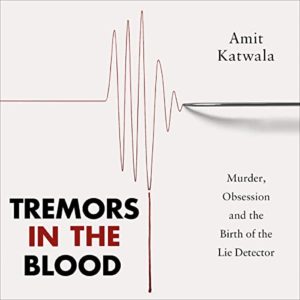Tremors in the Blood by Amit Katwala
Written by Ashley Kelmore, Posted in Reviews
Best for:
People who enjoy a mixture of history, true crime, and ethical discussions.
In a nutshell:
Author Katwala explores the creation and first two decades of the ‘lie detector’ (polygraph).
Worth quoting:
N/A
Why I chose it:
I like books like this usually – it feels like a subject Patrick Radden Keefe might have taken on.
What it left me feeling:
Educated.
Review:
In this book, author Katwala looks at the creator of the Polygraph, John Larson, who was a medical student interested in how one’s breath and blood pressure were impacted when someone knowingly told a lie. He eventually developed a machine that could allegedly detect these changes and tell when someone was telling a falsehood.
(He also used it as a very effective dating tool. The very first person Larson used it on in an official capacity was a sorority woman nine years his younger who he ended up marrying. I know people meet at work, but that seems to be a bit out of order.)
The book is told mainly through a couple of different cases from the 1920s and 1930s where it seems like the person is guilty, but the results of their polygraph tests are not conclusive. One is a man who might have paid people to kill his wife; another is a man who might have killed someone who was informing on him to the police. The stories themselves are interesting enough; bringing the polygraph into it makes them more complex.
In the US, polygraph results are not admissible at the federal level. But we have all seen Law & Order, right? People offering themselves up to take a lie detector test so that the police will stop investigating them. Or, conversely, we’ll see suspects refuse to take one, and people start to wonder why, and question their innocence.
The story follows as the polygraph gains popularity even though it cannot be used in federal cases. At one point Larson brings in someone named Keeler who takes over the work and sells it as much more infallible than it is, and seeks to make money off it, selling it to shopkeepers to test their employees to see if they’re stealing.
Here’s the thing though – the polygraph doesn’t really work. It definitely cannot definitively detect lies. And its use is ethically questionable at best. Larson sees this and speaks up; Keeler does not, though we get a sense with one of the later cases he’s involved in (one that ultimately results in someone being put to death) that he has his own doubts.
Overall this book was interesting and well-researched, but didn’t spend as much time as I would have liked on the ethics of the polygraph. The final coda was also deeply disturbing; it discusses how countries are making use of AI to detect lies. One claimed an 88% accuracy rate. Super! Unless you’re in the 12% and are telling the truth but the machine says you are lying.
As an aside: I listened to the audio version and I found the narrator’s pronunciation choices frustrating. I think part of it is the author is British so the narrator used some British pronunciations despite the narrator having a US or Canadian accent, which doesn’t quite work but I kind of get it. However, much of this book takes place in the San Francisco Bay Area, where I grew up, and the narrator consistently mispronounces the names of cities. That’s not hard to look up, so I’m confused as to how that got by the producers.
Recommend to a Friend / Keep / Donate it / Toss it:
Donate it

